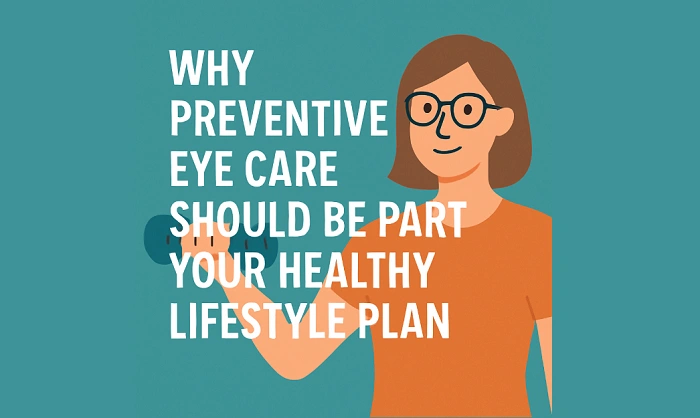When we think about building a healthy lifestyle, the usual pillars come to mind—balanced nutrition, regular exercise, quality sleep, and stress management. But there’s one important area that often gets overlooked: your eyes.
Vision health plays a critical role in how we move through the world, yet preventive eye care rarely gets the same attention as other wellness habits. Just like the rest of your body, your eyes need regular checkups, protection, and support to stay strong and healthy over time.
Adding preventive eye care to your wellness routine is a simple step that can make a big difference—not just for your vision, but for your overall health and quality of life. Here’s why it matters, and how you can easily make it part of your everyday plan.
How Eye Health Impacts Your Overall Well-Being
Your eyes do much more than help you see—they’re closely connected to your total body health. In fact, eye doctors are often the first to spot signs of underlying health conditions like diabetes, high blood pressure, and even neurological disorders during a comprehensive eye exam.
When your vision is strong, it supports your ability to:
- Stay physically active — Good depth perception and clear sight make exercise and daily movement safer and more enjoyable.
- Maintain independence — Tasks like driving, cooking, reading, and using technology all rely heavily on healthy vision.
- Protect mental sharpness — Struggling to see clearly can lead to cognitive fatigue, frustration, and even a faster decline in brain health over time.
- Feel more energized and confident — Reducing eye strain and avoiding hidden vision issues can improve your mood, focus, and overall well-being.
Prioritizing preventive eye care isn’t just about protecting your sight—it’s about creating a stronger foundation for how you feel, move, and thrive every day.
Common Eye Problems That Preventive Care Can Catch Early
One of the biggest advantages of routine eye exams is the ability to catch potential problems long before symptoms become serious. Many vision issues develop slowly—and without obvious warning signs—until they start to interfere with daily life.
Here are some common conditions that preventive eye care can help detect early:
- Glaucoma — Often called the “silent thief of sight,” glaucoma typically has no symptoms until significant vision loss occurs.
- Macular degeneration — A leading cause of central vision loss in older adults, but manageable when caught early.
- Cataracts — Clouding of the eye’s natural lens, which can be treated more easily in its early stages.
- Diabetic retinopathy — A complication of diabetes that affects blood vessels in the retina, detectable before major vision changes occur.
- Dry eye disease — Common among people with high screen time or certain medical conditions; early treatment can improve comfort and prevent further irritation.
Preventive exams help identify these conditions at a stage when treatment options are more effective—and when it’s still possible to protect your quality of life.
The Power of Local Eye Care Providers
Staying consistent with preventive eye care is much easier when you have a trusted provider nearby. Local eye care professionals not only make regular checkups more convenient, but they also get to know your vision history—allowing for more personalized, proactive care.
In Utah, working with experienced Layton eye doctors means you have easy access to comprehensive exams, early detection services, and expert advice tailored to your needs and lifestyle.
Similarly, if you’re located in British Columbia, booking an eye appointment in Vernon ensures you’re partnering with a team that understands how to protect and maintain your vision health as part of your larger wellness journey.
When you make regular eye exams part of your healthy lifestyle, having the right local support system makes it that much easier to stay on track.
How to Incorporate Eye Care Into Your Healthy Lifestyle
Adding vision health to your wellness routine doesn’t have to be complicated. Small, consistent habits can go a long way toward protecting your eyes—and your overall well-being.
Here are simple ways to make preventive eye care part of your healthy lifestyle:
- Schedule a comprehensive eye exam annually — even if you haven’t noticed changes in your vision.
- Wear sunglasses that block 100% of UVA and UVB rays to protect against sun-related eye damage.
- Practice the 20-20-20 rule — every 20 minutes, look at something 20 feet away for 20 seconds to reduce digital eye strain.
- Eat a vision-friendly diet — include leafy greens, colorful vegetables, and omega-3 rich foods like salmon and walnuts.
- Stay hydrated — proper hydration supports healthy tear production and eye moisture.
- Protect your eyes during physical activities — use appropriate eyewear for sports, home projects, or outdoor adventures.
- Listen to early warning signs — headaches, blurred vision, or eye discomfort are signals not to ignore.
When eye care becomes a normal part of your overall wellness habits, you’re investing not just in better sight—but in better energy, confidence, and long-term health.
Healthy Eyes, Healthier Life
Wellness isn’t just about eating right or staying active—it’s about taking care of your whole body, including your vision. Your eyes play a crucial role in how you move, connect, and experience life every day.
By making preventive eye care a regular part of your healthy lifestyle plan, you’re not just protecting your sight—you’re supporting better balance, sharper focus, and greater independence over the long term. Whether it’s scheduling that overdue exam, practicing smart screen habits, or connecting with trusted local providers, small actions now can lead to major benefits later.
True wellness means seeing the full picture—and taking steps today to keep it clear for years to come.


